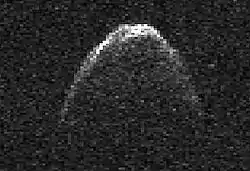(308242) 2005 GO21
(308242) 2005 GO21 is a large Aten near-Earth asteroid and potentially hazardous object.[2] It has a well determined orbit with an observation arc of 7 years and an uncertainty parameter of 0.[2] It was discovered on 1 April 2005 by the Siding Spring Survey at an apparent magnitude of 18.1 using the 0.5-metre (20 in) Uppsala Southern Schmidt Telescope.[1]
 | |
| Discovery[1] | |
|---|---|
| Discovered by | Siding Spring Srvy. |
| Discovery site | Siding Spring Obs. |
| Discovery date | 1 April 2005 |
| Designations | |
| (308242) 2005 GO21 | |
| Aten · NEO · PHA[2] | |
| Orbital characteristics[2] | |
| Epoch 13 January 2016 (JD 2457400.5) | |
| Uncertainty parameter 0 | |
| Observation arc | 3385 days (9.27 yr) |
| Aphelion | 1.0093 AU (150.99 Gm) |
| Perihelion | 0.49720 AU (74.380 Gm) |
| 0.75324 AU (112.683 Gm) | |
| Eccentricity | 0.33992 |
| 0.65 yr (238.8 d) | |
| 19.462° | |
| 1.5077°/day | |
| Inclination | 24.926° |
| 272.70° | |
| 156.62° | |
| Earth MOID | 0.0452219 AU (6.76510 Gm) |
| Physical characteristics | |
Mean diameter | ~1.6 km[3] |
| 11.00 h[2][3] | |
| 16.5[2] | |
Based on an absolute magnitude of 16.4,[2] the asteroid has an estimated diameter of 1.6 km (within a factor of two).[3] (308242) 2005 GO21 is the largest potentially hazardous asteroid (PHA) discovered in 2005.[4] On 21 June 2012 it passed Earth at a distance of 0.043963 AU (6,576,800 km; 4,086,600 mi).[5] The 2012 passage was studied with radar using Goldstone and Arecibo.[3]
References
- "MPEC 2005-G31 : 2005 GO21". IAU Minor Planet Center. 5 April 2005. Retrieved 18 June 2012. (K05G21O)
- "JPL Small-Body Database Browser: 308242 (2005 GO21)" (last observation: 2012-06-17; arc: 7.21 years). Jet Propulsion Laboratory. Retrieved 7 April 2016.
- Dr. Lance A. M. Benner (18 June 2012). "(308242) 2005 GO21 Goldstone Radar Observations Planning". NASA/JPL Asteroid Radar Research. Retrieved 18 June 2012.
- "JPL Small-Body Database Search Engine: PHAs and H < 17 (mag)". JPL Solar System Dynamics. Retrieved 20 November 2011.
- "JPL Close-Approach Data: 308242 (2005 GO21)" (last observation: 2012-06-17; arc: 7.21 years). Retrieved 18 June 2012.
External links
- (308242) 2005 GO21 at NeoDyS-2, Near Earth Objects—Dynamic Site
- (308242) 2005 GO21 at ESA–space situational awareness
- (308242) 2005 GO21 at the JPL Small-Body Database
This article is issued from Wikipedia. The text is licensed under Creative Commons - Attribution - Sharealike. Additional terms may apply for the media files.